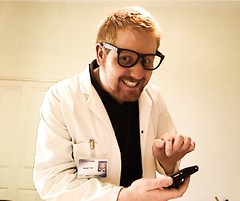 Some of the comments that my last two blog posts have incited lead me to write one more thing about Bobby. I have no issue with anything that has been said in those comments. I feel, though, that a big part of the point of my story has been overlooked.
Some of the comments that my last two blog posts have incited lead me to write one more thing about Bobby. I have no issue with anything that has been said in those comments. I feel, though, that a big part of the point of my story has been overlooked.
I will say here that I became a teacher because I wanted to help children and watch them grow and become more capable, compassionate and respectful of the culture and society of their community and their world. That said, I believe that teaching has become way to clinical. In our misguided efforts to establish success by being able to measure learning, we have fabricated a system of complex and rigid classifications with symptoms, diagnoses and prescribed treatments. We have tried to make teaching a science, and it is not. Teaching is an art.
In the early days of NCLB, being an educator was compared to being a pharmacist, where less than successful learners could be treated with scientifically proven best practices and the application of big data.
Of course this clinical approach does describe part of what it is to teach. I call this the teacher-technician. However, what Bobby’d learned, that enabled him to diagnose my car’s problem from the telling of my entertaining story, did not result from an elaborate construct of scientifically proven best practices. It happened because of a family or close-knit community that talked about cars; what made them work and what made them work better. They valued good cars that could be made faster than they were off the showroom floor, and they valued the folks who could accomplish it. They worked on cars. They fixed them. ..and sometimes it didn’t work, and they talked about it – and they learned from what went wrong.
Bobby’s story is not meant to promote classrooms that are shaped by established and described differentiations and toolboxes of prescribed remedies. What I would rather see are teacher-philosophers who are skilled, knowledgeable and can facilitate a learning community that:
- Values what is being learned
- Respects the learning that comes from success
- Respects the learning that comes from failure and
- Celebrates what learners can do with what they have learned.
It is a classroom where students can turn around and look back at the concrete and public results of their learning.
